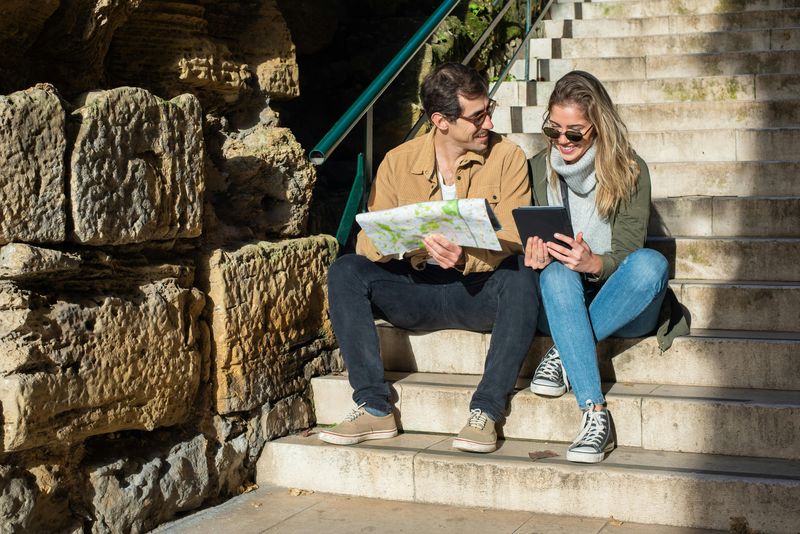Ever find yourself with a trip itinerary so packed that you need a vacation from your vacation? Many travelers fall into the trap of planning every single minute, turning what should be a relaxing adventure into a stressful race against the clock. But here’s the truth: some of the most magical travel moments happen when you loosen your grip on the schedule and let the journey surprise you.
1. You Reduce Stress and Pressure
Rigid schedules create unnecessary anxiety when reality doesn’t match your perfectly timed plan. Trains run late, museums close unexpectedly, and weather changes without warning. When you’ve mapped out every hour, these normal hiccups feel like disasters instead of minor adjustments.
Traveling with flexibility means accepting that things won’t always go according to plan. That acceptance alone lifts a huge weight off your shoulders. You’ll spend less time panicking about being five minutes behind schedule and more time actually enjoying where you are.
Think of your itinerary as suggestions rather than commandments. This mindset shift transforms obstacles into opportunities rather than sources of frustration.
2. You Make Room for Spontaneous Adventures
Some of the best travel stories start with “We weren’t planning to, but…” That little café you stumbled upon. The festival you didn’t know was happening. The friendly local who invited you to their family dinner.
These magical moments need breathing room in your schedule. When every hour is booked, you can’t say yes to unexpected invitations or follow intriguing side streets. Spontaneity requires empty spaces where serendipity can sneak in.
Did you know? Studies show that spontaneous experiences often create stronger memories than planned activities. Leave gaps in your itinerary, and watch how quickly they fill with unforgettable surprises that no guidebook could have predicted.
3. You Give Yourself Freedom to Slow Down
Racing from landmark to landmark turns travel into a competitive sport. You’re constantly checking your watch, gulping down meals, and speed-walking past things that deserve a second glance. Where’s the joy in that?
Slowing down lets you actually taste your food, notice architectural details, and have real conversations. You might spend an entire afternoon in one neighborhood instead of checking off five different districts. That depth of experience beats surface-level sightseeing every time.
Travel isn’t about how many places you can cram into one trip. It’s about savoring moments that make you feel alive and connected to somewhere new.
4. You Avoid Travel Fatigue and Burnout
Packing too much into each day sounds productive until you’re dragging yourself through day four, resenting every activity on your list. Your body and mind need rest, especially when adjusting to new time zones, climates, and constant stimulation.
Overplanning often means overscheduling. You wake up tired, push through fatigue to hit every planned stop, then crash hard at night only to repeat the cycle. By mid-trip, you’re daydreaming about your own couch instead of enjoying where you are.
Building in downtime isn’t lazy—it’s smart. A well-rested traveler notices more, enjoys more, and remembers more than someone running on empty.
5. You Stay Flexible When Plans Change
Weather happens. Transportation delays occur. Places close for renovations. These aren’t travel failures—they’re normal parts of exploring the world. But when your entire trip operates like a house of cards, one change topples everything.
Flexible travelers roll with changes instead of fighting them. Raining at the beach? Perfect day for museums. Bus delayed two hours? Time to explore the neighborhood you’re already in. This adaptability turns potential disasters into pleasant alternatives.
The ability to pivot without panic is a superpower. You’ll handle unexpected situations with creativity rather than complaints, making your travel companions much happier in the process.
6. You Allow Genuine Cultural Immersion
Rushing between tourist attractions means experiencing a place through glass—you see it but don’t really connect with it. Real cultural understanding happens in unplanned conversations, accidental discoveries, and wandering through residential neighborhoods where actual life unfolds.
When you’re not glued to a schedule, you can follow your curiosity down unfamiliar streets. You have time to chat with shop owners, watch how locals interact, and notice the rhythms of daily life. These observations teach you more than any museum placard.
Cultural immersion requires patience and presence. It can’t be scheduled between 2:00 and 3:30 PM. It emerges naturally when you stop treating destinations like checkboxes.
7. You Stop Treating Travel Like a Checklist
“Been there, done that, got the photo” isn’t really experiencing a place—it’s collecting proof you were there. When travel becomes about ticking boxes, you miss the actual point: connecting with new places, people, and perspectives.
Checklist mentality creates pressure to see everything, which paradoxically means you truly see nothing. You’re so focused on the next item that you barely register the current one. Your photos prove you were there, but your memories feel strangely empty.
Shift your goal from quantity to quality. Would you rather say you saw twenty places or that you truly experienced five? Depth beats breadth when it comes to meaningful travel.
8. You Better Enjoy the In-Between Moments
The journey between destinations holds its own magic: watching landscapes change from train windows, people-watching at bus stations, or discovering unexpected beauty during a simple walk. These in-between moments often become favorite memories, yet overplanners rush right past them.
There’s something meditative about unstructured travel time. You can daydream, journal, or simply exist without purpose. That café where you killed an hour people-watching might end up more memorable than the famous monument you rushed to see.
Embrace the pauses, the scenery, the wandering. Travel isn’t just about destinations—it’s about everything that happens while you’re getting there and what you notice along the way.
9. You Improve Mental Presence and Mindfulness
Constantly worrying about your next stop keeps your mind in the future instead of the present. You’re physically in an amazing place but mentally already three steps ahead, checking times and routes. This divided attention steals your ability to fully experience where you actually are.
Presence is a skill that needs practice. When you’re not enslaved to a rigid schedule, you can actually notice the smell of street food, the sound of a foreign language, or the feel of cobblestones under your feet. These sensory details create rich, lasting memories.
Being mentally present makes travel more vivid and meaningful. You’ll remember how places made you feel, not just what they looked like in your photos.
10. You Allow Serendipity and Unplanned Magic
Ask seasoned travelers about their best memories, and they’ll rarely mention the famous landmarks they planned to see. Instead, they’ll tell you about the unexpected: the stranger who became a friend, the wrong turn that led somewhere beautiful, or the local event they stumbled upon by accident.
Serendipity needs space to work its magic. It can’t operate in a schedule packed tighter than a subway car. Those perfect unplanned moments happen in the margins, in the gaps you leave open for possibility.
Some of your best travel stories haven’t happened yet—and they never will if you don’t leave room for them. Trust that wonderful things can happen without being scheduled.










